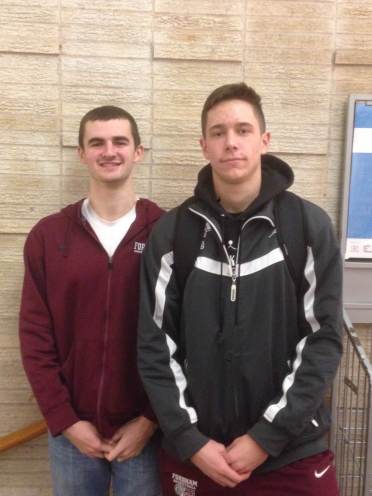
Chris Scerbo (left) and Tom Mahoney (right) are just two of Fordham basketball’s extremely hard-working managers.
By James Decker
Whether you watch basketball games live or on TV, you have probably seen the managers of the team behind the bench giving players water or a towel. The truth of the matter is that there is a lot more that goes into being a manager of a basketball team than what we see at games. Working as a manager does not just mean working on game nights, but also in practice and behind the scenes. There are five managers for the men’s basketball team and five for the women’s basketball team, contributing to the team in important, but often unseen ways.
Chris Scerbo, sophomore manager for the Fordham men’s basketball team, says preparation is key for getting through the day as a manager.
“I get to Rose Hill Gym about an hour early for practice. I set up the tape on the court and get the water ready,” Scerbo said. “I’m prepared for anything that the coaches or players need to get done; I’ve made significant strides in being ready to make a pass to a player on the court when needed.”
For game-day preparation, the setup is slightly different. “For games, I’m either behind the bench handling water, towels and shooting shirts or filming the game from the stands.” Scerbo also added that he “prefers being behind the bench. I like living and breathing with each and every possession, and you really get the full game-day experience from behind the bench.”
Tom Mahoney is a senior manager for the Fordham women’s basketball team, and has similar responsibilities.
“I’m responsible for assisting the staff and the players with on the court activities,” Mahoney said. “Hydrating the players, filming practices, as well as handling wake up calls and meals on the road.”
As for the experiences at a game, Mahoney also agrees that the bench is the preferred spot.
“I definitely prefer the bench life. Timeouts, play calls and close calls are all much more exciting from right behind the bench.”
The managers’ work does not go unnoticed among the players.
“The work that the managers do is absolutely pivotal,” sophomore guard Matt Massimino said. “Their work ethic before, during and after practice is admirable, and it even motivates the players to get after it on the court.”
It is more than just about how the managers work, though, as the managers and players often become close in the process.
“The managers and the players are really like brothers,” redshirt junior guard D.C. Gaitley said.
For Scerbo and Mahoney, the rewards come in different forms.
“For me the biggest reward is elation I feel after the Rams win,” Scerbo said. “I feel accomplished when we win, and I’m glad to help in any way possible.”
Mahoney finds his rewards in a more personal outlook.
“When a coach or player says thank you or gives me a compliment for the work that I’ve done, it means a lot,” Mahoney said. “Knowing that the little help that I give can go a long way is a big part of what makes this job what it is.”
Some people may see only the surface of the manager job. It is easy to assume that the managers are just recipients of gear for setting up practice and sitting behind the bench during games, but the job really does go further than that. Managers have to be prepared for different types of assignments from coaches and players, and, as cliche as it may sound, they really are as big a part of the day-to-day happenings of the team as any of the players or coaches.
Next time you attend a Fordham basketball game, don’t be afraid to clap for the managers, sitting behind the bench or filming the game, because they do deserve a hand for their hard work.
